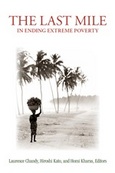The Last Mile in Ending Extreme Poverty

The goal of ending extreme poverty - life on less than $1.25 per day - by 2030 appears within reach; the rate fell from 80 percent in 1820 to less than 20 percent today.
But ridding the world of that last 20 percent, or "the last mile," will require not just economic growth, but peace, jobs, and resilience, argues a book edited by JICA Vice President Hiroshi Kato and two Brookings Institution fellows.
"The Last Mile in Ending Extreme Poverty," a collaboration between JICA-RI and Brookings, was published July 20, 2015.
Akio Hosono, Yoichi Mine and Go Shimada of JICA-RI and Ryutaro Murotani of JICA wrote chapters.
The book is timely because the goal of eliminating extreme poverty is likely to be adopted the year 2015 as one of the Sustainable Development Goals for 2030.
"Economic growth has, of course, been the main engine of mass poverty reduction in the past," write the editors in the opening chapter. "... this book's focus is on three other ingredients that are needed to promote fast and sustained poverty reduction in many of today's poorest countries: peace, jobs and resilience."
The other eleven chapters, by various experts, address what can be done to secure those ingredients.
The decline in extreme poverty around the world has been particularly rapid in the past 25 years, but a number of circumstances call into question whether complete elimination is possible. These include more complex and longer conflicts, a lack of structural reforms in poor economies and an increase in the number of natural disasters because of climate change.
scroll